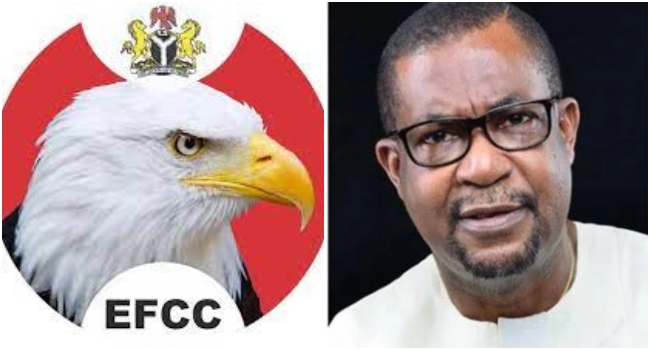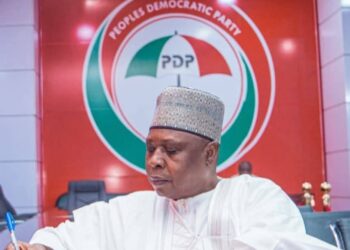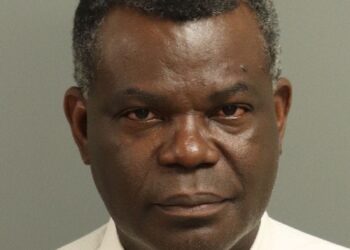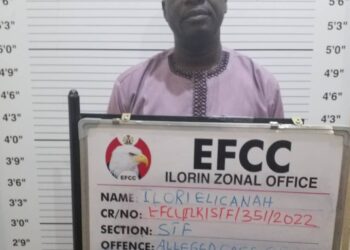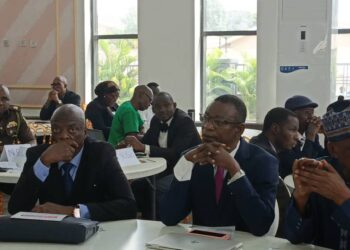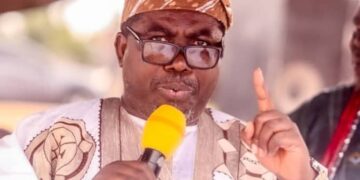A former Minister of Power amd Steel, Dr Olu Agunloye, has told a Federal high court sitting in Abuja that he did not commit any financial crime while in office.
Agunloye stated this before the court presided over by Justice Jude Onwuegbuzie on Tuesday, April 22, 2024.
He told the court that the
EFCC cannot prosecute him on the Mambilla power project, which is now subject of ongoing international arbitration in France between Sunrise Power and Transmission Company Limited and the Federal Government of Nigeria.
The Mambilla project was initially awarded to Messrs Sunrise by Dr Agunloye as a Build Operate and Transfer (BOT) contract at zero cost to the FGN when he was a Minister in May 2003.
However, between June 2003, when Agunloye ceased to be a Minister, and October 2022, multiple complex developments between Messrs Sunrise and the FGN have led the parties to an International Arbitration at which Messrs Sunrise submitted claims for breach of agreements and damages against Nigeria and for which FGN filed a Statement of Defence and consequently to corroborate its Defence at the Arbitration, the FGN proceeded to charge Agunloye with criminal offences for the award of the 2003 BOT contract to Sunrise.
The Agunloye trial sat again on Monday, 22 April 2024 for hearing of the defendant’s pending motion on notice challenging the jurisdiction of EFCC to investigate and prosecute the extant charge before the court considering the Supreme Court decision in NWOBIKE v. FRN (2021).
At the court, Agunloye and EFCC joined issues on the Preliminary Objection raised by Agunloye who had filed that the EFCC is not competent to try him because (a) he has not committed any financial crimes, (b) that the seven charges raised by EFCC against him are not covered by the EFCC Act and (c) that his prosecution by EFCC was not supported by a valid and legal Fiat.
In respect of the Preliminary Objection, the Defence Counsel gave sketch idea on the motion by referring the court to the EFCC Act, more particularly Sections 7(1) and (2) which mandate the EFCC to cause investigations into offences under the act relating to economic and financial crimes, and or serve as the coordinating agency for the enforcement of the Money Laundering Act, the Advance Fee Fraud and other Related Offences Act, the Failed Bank (Recovery of Debt and Financial Malpractices in Banks) Act, the Banks and Other Financial Institutions Act, the Miscellaneous Offences Act, and any other law or regulations relating to economic and financial crimes.
The Defence Counsel placed emphasis on section 7(2) (f) EFCC Act which says that the EFCC shall enforce or prosecute any other law or regulation relating to economic and financial crime only.
Defence Counsel argued that the offences in the charges against Agunloye have no nexus whether proximately or remotely to economic and financial crimes.
” The charges, for instance, of forgery of a letter written and signed by Agunloye as a serving Minister can be taken by police or ICPC,” he said.
The Counsel cited that in the case of Nwobike v. FRN, the Supreme Court had delimited the powers of EFCC that they can only investigate and prosecute economic and financial crimes.
The defence lawyers also argued that EFCC did not obtain a lawful or valid fiat from the Attorney General of the Federation to prosecute Agunloye.
The lawyers argued that the criminal charges filed by EFCC against Agunloye on September 7, 2023 were done with a fiat issued by the Solicitor General when there was a substantive Attorney General of the Federation on seat.
However, the leading counsel for EFCC placed heavy reliance on the fiat issued by the Solicitor General , insisting that it was same as from the office of the Attorney General of the Federation which was then being manned by the office of the Solicitor General in an acting capacity at the time of issue of the Fiat in August 2023.
The defence lawyers quickly countered the EFCC’s argument and referred the court to Section 174 of the Constitution of Nigeria which stipulates that only the Attorney General of Federation has the power to issue a fiat for the prosecution of a charge, not the Solicitor General or any other law officer.
The defence further argued that the failure of the sitting Attorney General of the Federation, as of 7 September 2023 when the case was filed at the FCT High Court, to ratify the fiat issued by the Solicitor General in August 2023, or reissue a new fiat simply invalidates the purported fiat upon which EFCC relies to investigate and prosecute charges against Agunloye.
Agunloye’s lawyers urged the court to note that the argument of EFCC that it could prosecute under the ICPC Act was not expressly mentioned in the EFCC Act or anywhere else.
Agunloye’s lawyers on relying on the purposive rule of construction, intention of legislative drafting, insisted that if the draftsmen of EFCC Act had contemplated that EFCC could or would prosecute under the ICPC Act, it would have listed the ICPC Act expressly under sub 7(2) of the EFCC Act being a latter legislation but it did not, which means it was not contemplated.
“And therefore, EFCC must be delimited and circumscribed to economic and financial crimes as is stipulated in its Enabling Act of 2004 and upheld by the Supreme Court in 2021,” they argued.
The defence lawyers pointed out that the EFCC’s reference to the case of AUDU v. FRN (2018), a Court of Appeal decision relied upon by the prosecution in their written address is not applicable because the argument in the case AUDU v. FRN (2018) does not imply that EFCC could prosecute under ICPC Act or any other law, but that it must be circumscribed to economic and financial crimes.
“The applicability of the decision in Audu v. FRN has no bearing to the defendant’s case because the offences charged before this court are not economic and financial crimes,” they further submitted.
The defence counsel pointed out that, even if EFCC can prosecute under the ICPC Act, it must be strictly with respect to economic and financial crimes.
The defence lawyers further referred the Court to the case of YAKUBU v. FRN (2009) where the Court of Appeal held that cases on alleged corruption must be investigated by the ICPC, and where such corruption by a public officer extends to breach a financial regulation or legislation by such a public officer, the ICPC shall have the authority to prosecute same.
In adumbration of its position, Agunloye’s defence lawyers drew the attention of the court to the principles of judicial precedent and stare decisis, which postulates that decisions of superior courts in the system are binding and urged the court to note that a 2018 decision of the Court of Appeal cannot supersede or override a 2021 decision of the Supreme Court in the case of NWOBIKE v. FRN which specifically delimited the powers of EFCC to investigation and prosecution of financial and economic crimes to back the argument on EFCC’s incompetence to investigate and try Agunloye.
The judge, Justice Jude Onwuegbuzie, adjourned the trial to 15 May , 2024 to give his ruling on the Preliminary Objection as well as consider, depending on how the ruling goes, the hearing of Agunloye’s Application on EFCC’s tampering with his sureties with intention to arm-twist them to withdraw their sureties. (vitalnewsngr.com)


